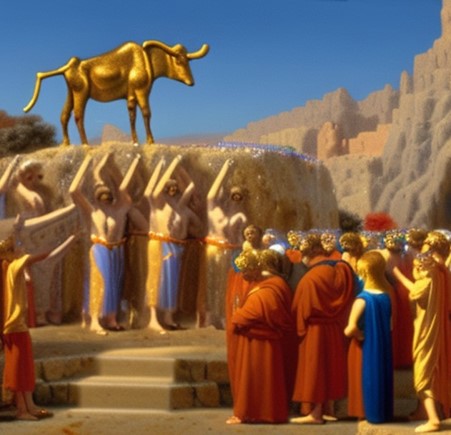Good morning!
Greetings in the name of the Father, the Son, and the Holy Spirit.
“But the fruit of the Spirit is love, joy, peace, forbearance, kindness, goodness, faithfulness, gentleness and self-control. Against such things there is no law.” – Galatians 5:22-23

Picture this deeply poignant moment in biblical history: the Children of Israel, newly liberated from the harsh clutches of Egyptian servitude, find themselves in the midst of the wilderness, encamped at the foot of the awe-inspiring Mount Sinai. Their stalwart leader, Moses, who had been their beacon of hope amidst despair, their voice of courage amidst fear, has ascended the formidable mountain. He has disappeared into the thick shroud of clouds that crowns the peak, leaving the Israelites to anticipate his return from this divine appointment.
As the days roll into nights and Moses’ absence stretches, the atmosphere among the Israelites becomes fraught with uncertainty and restlessness. The mountain, once a symbol of God’s reassuring presence, now looms ominously, its peak hidden in impenetrable clouds. The very leader who had guided them through the Red Sea and into freedom was now seemingly swallowed by the mountain’s mists, and they felt leaderless, their future uncertain.
In the face of this escalating anxiety, an error in judgment of enormous magnitude takes root. A testament to human frailty and impatience, the people commit a grave transgression against the very first commandment that God had given them: “You shall have no other gods before me.” They cast a golden calf and bow before it in worship, an act of flagrant idolatry that would have deep and lasting repercussions.
Our journey into this critical chapter is not a mere historical excursion. Rather, it is an exploration of how, like the Israelites, we too might falter in times of uncertainty, how fear and impatience can lead us into actions we later regret. As we delve into this narrative, let’s not only learn about the Israelites of old but also reflect on our own faith journey, on our moments of wavering, and on God’s abundant mercy and enduring love that beckon us back each time we falter.
The Roots of Disobedience – Impatience:
At the opening of Exodus 32, we are confronted by the impatience of the Israelites, as they anxiously wait for Moses’ return from Mount Sinai. The scripture recounts: “When the people saw that Moses was so long in coming down from the mountain, they gathered around Aaron and said, ‘Come, make us gods who will go before us. As for this fellow Moses who brought us up out of Egypt, we don’t know what has happened to him.'” (Exodus 32:1).
In their impatience, the Israelites revealed their lack of trust and understanding in the divine timetable. Their inability to endure Moses’ absence marked the onset of their disobedience. This significant episode compels us to scrutinize the relationship between impatience and disobedience, shedding light on the destructive power of impatience, which, like yeast in bread, can quickly permeate our entire being, leading us away from the path of obedience.
Impatience can often be seen as the seedbed of disobedience, a root that sprouts to bear bitter fruit. In their haste, the Israelites sought to manufacture their own gods, driven by their impatience and a desire for immediate gratification. Here, impatience not only led to the making of the golden calf but also to a more insidious act – idolatry – a violation of the very first commandment given by God.
The New Testament continues to reiterate the virtues of patience and the perils of impatience. In the parable of the prodigal son, Jesus illustrates how the younger son’s impatience led him to demand his inheritance prematurely, leading to reckless living and eventual despair (Luke 15:11-32).
The apostle Paul repeatedly underscores the significance of patience in the life of a believer. In Romans 5:3-5, Paul writes, “Not only so, but we also glory in our sufferings, because we know that suffering produces perseverance; perseverance, character; and character, hope. And hope does not put us to shame, because God’s love has been poured out into our hearts through the Holy Spirit, who has been given to us.”
In the race of faith, patience is not only a virtue but a necessity. Hebrews 12:1 exhorts us, “let us run with patience the race that is set before us.” Patience is presented not as a passive waiting but an active endurance that transforms our character and deepens our trust in God.
James, in his epistle, further highlights the significance of patience, using the metaphor of a farmer awaiting the precious fruit of the earth. “Be patient, then, brothers and sisters, until the Lord’s coming. See how the farmer waits for the land to yield its valuable crop, patiently waiting for the autumn and spring rains.” (James 5:7).
As we reflect on the narrative of the golden calf, let us understand the implications of impatience and how it paves the way for disobedience. In a world that champions speed and instant gratification, let’s learn to cultivate the fruit of the Spirit – patience. As Paul writes in Galatians 5:22-23, “But the fruit of the Spirit is love, joy, peace, forbearance, kindness, goodness, faithfulness, gentleness and self-control.”
By taming our impatience, we can avert the path of disobedience, and instead, grow in our trust and obedience to God, remaining steadfast in faith as we await His perfect timing.

The Wages of Idolatry – Disobedience:
The Israelites’ descent into idolatry wasn’t just a stumble; it was a free fall. Frustrated by Moses’ prolonged absence, they gathered around Aaron and demanded, “Come, make us gods who will go before us” (Exodus 32:1). What followed was an appalling disregard for the very first commandment that God had given them: “You shall have no other gods before me” (Exodus 20:3).
As we dissect this egregious incident, we realize that idolatry is much more than a physical act of worshipping a graven image; it is a mental and spiritual orientation, an issue of the heart. It represents a fundamental shift in our trust, love, and allegiance from the Creator to the created, from the Divine to the mundane. This shift often begins subtly, almost imperceptibly, as we allow other things or people to take God’s place in our lives. The Israelites’ golden calf can be seen as a symbol of our modern-day idols, which, while perhaps not as overtly religious, are just as spiritually damaging. Money, power, status, material possessions, relationships, ambition — these can all become ‘golden calves’ if they take precedence over God in our hearts.
In the New Testament, we find clear echoes of this concern. Paul warns the Corinthians about the dangers of idolatry, reminding them of the Israelites’ folly: “These things occurred as examples to keep us from setting our hearts on evil things as they did. Do not be idolaters, as some of them were” (1 Corinthians 10:6-7).
Colossians 3:5 further defines idolatry, “Put to death, therefore, whatever belongs to your earthly nature: sexual immorality, impurity, lust, evil desires and greed, which is idolatry.” Here, Paul lists a variety of things, including greed, as forms of idolatry, underlining that anything we covet or prioritize over God is an idol.
We also find wisdom on this subject in the First Epistle of John, which ends with a powerful exhortation: “Dear children, keep yourselves from idols” (1 John 5:21). The terse warning is a sober reminder that idols are not always as conspicuous as a golden calf; they can be much subtler yet equally destructive.
The antidote to idolatry is a heart devoted to God. As we’re reminded in Matthew 22:37, “Jesus replied: ‘Love the Lord your God with all your heart and with all your soul and with all your mind.'” When God occupies the preeminent place in our lives, there is no room for idols.
Furthermore, in Romans 12:2, Paul encourages us not to conform to the pattern of this world but to be transformed by the renewing of our minds. By doing this, we can better discern God’s will and resist the allure of modern-day idols.
As we delve deeper into the narrative of the golden calf, let us heed the warnings against idolatry. Let’s examine our hearts, acknowledging and dismantling any idols that might reside there. In doing so, we can realign our hearts with God, following His commandments, and putting Him first in all things. This, indeed, is the true act of obedience.
The Ripple Effects of Disobedience:
As we continue our journey through Exodus 32, we encounter the sobering aftermath of the Israelites’ disobedience: the ripple effects of their actions. The decisions we make, particularly those that involve turning away from God’s commands, do not occur in a vacuum. They reverberate through our lives, affecting not only our personal relationship with God but also the relationships we have with those around us.
When the Israelites chose to fashion and worship the golden calf, the consequences were immediate and devastating. Their disobedience led to division and death within their community (Exodus 32:26-28). Moses’ command, “Whoever is for the Lord, come to me,” resulted in a stark division among the people, with the Levites rallying to him. The ensuing judgement left three thousand men dead, a chilling reminder of the consequences of turning away from God.
In the New Testament, we see echoes of this theme. Paul, in his letter to the Galatians, says, “Do not be deceived: God cannot be mocked. A man reaps what he sows” (Galatians 6:7). This verse doesn’t merely refer to an eternal judgement; it also encompasses the earthly consequences of our actions. Disobedience to God often leads to turmoil, heartache, and the fracturing of relationships, even as it estranges us from God’s presence and peace.
In Romans 6:23, Paul further expounds on the repercussions of disobedience: “For the wages of sin is death, but the gift of God is eternal life in Christ Jesus our Lord.” The ‘death’ here is not just physical, but spiritual. Sin separates us from God, the source of life, and this separation is the essence of spiritual death.
The narrative of the golden calf also teaches us about the communal impact of sin. The actions of a few led to devastation for many. This principle is reflected in 1 Corinthians 12:26, where Paul describes the church as a body: “If one part suffers, every part suffers with it.” Our actions can either build up or tear down the community of faith.
But in the midst of these grim consequences, we find a beacon of hope in the person of Moses. His intercession for the people (Exodus 32:30-32) underscores the power of compassionate, God-centered leadership. In the New Testament, we see Jesus as the ultimate intercessor, who “is at the right hand of God and is also interceding for us” (Romans 8:34).

As we contemplate the ripple effects of disobedience, let us remember that our actions have far-reaching implications. The choices we make affect not just our relationship with God, but also our relationships with others. We are called to live in obedience to God, not just for our own sake, but also for the health and well-being of our community. At the same time, let’s remember the hope we have in Christ, who not only bore the consequences of our disobedience but who continually intercedes for us. Through Him, we are empowered to choose obedience and experience reconciliation with God and others.
Conclusion and Life Application:
As we reflect on the events surrounding the creation of the golden calf in Exodus 32, we can’t help but recognize ourselves in the Israelites’ actions. Their impatience, their disobedience, and the idolatry that resulted are, unfortunately, still prevalent in our spiritual journeys today.
In a culture that values instant gratification and speedy results, we’re all too familiar with the temptation to rush God’s timing. We yearn for immediate answers, fast fixes, and rapid responses. This impatient mindset can often lead us away from God’s plans and into the arms of our personal ‘golden calves.’ Like the Israelites, we might be drawn to create something tangible, something manageable, that fits into our own desired timelines and plans.
However, we have a perfect model of patience and obedience in Jesus Christ. Christ’s journey on earth, His ministry, and ultimately His sacrifice on the cross epitomize patience, obedience, and surrender to God’s will. As it says in Hebrews 12:2, “For the joy set before him he endured the cross, scorning its shame, and sat down at the right hand of the throne of God.” Despite the pain and suffering He endured, Jesus remained patient and obedient, carrying out God’s will even unto death.
Our disobedience can carry heavy consequences, as the Israelites learned firsthand. It can lead us into idolatry, disrupting our relationship with the living God, and causing division among believers. However, the good news of the Gospel is that, through Christ’s work on the cross, we can be forgiven, grace can be extended, and relationships can be restored.
Our Savior, through His death and resurrection, has provided us the means to turn from our personal golden calves and return to God. As it says in Colossians 2:14, “He forgave us all our sins, having canceled the charge of our legal indebtedness, which stood against us and condemned us; he has taken it away, nailing it to the cross.”
In conclusion, we are called to recognize the profound love that God has for us, a love so great that He sent His only Son to die on a cross for our sins, including our disobedience and idolatry. Our golden calves were nailed to that cross with Him, and in their place, we’ve been given grace, forgiveness, and eternal life.
So let us not give in to the pressures of this world that prompt us to satisfy our desires instantly or to lose patience in God’s timing. Let us cling tightly to the cross of Christ and His commandments, ensuring He remains the center of our lives. Let the image of Jesus, obedient and patient unto death, inspire us to trust in God’s timing and reject any golden calves we might be tempted to create. As we move forward, let us remember the Apostle Paul’s words in Galatians 6:9 : “Let us not become weary in doing good, for at the proper time we will reap a harvest if we do not give up.”
What’s your golden calf?

“Do not conform to the pattern of this world, but be transformed by the renewing of your mind. Then you will be able to test and approve what God’s will is–his good, pleasing and perfect will.” – Romans 12:2
